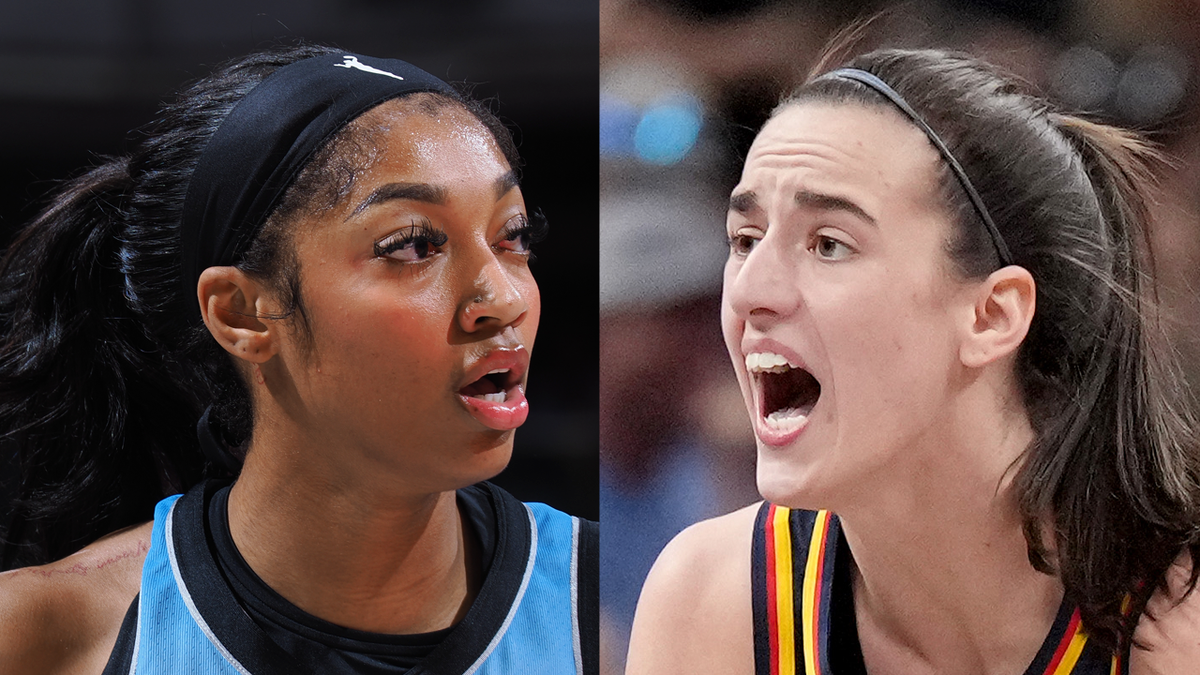The Angel Reese vs. Caitlin Clark Debate: Redefining Women’s Basketball Stardom

The statement, “Nobody would know who Angel Reese is without Caitlin Clark putting her on our radars,” has sparked a heated debate among basketball fans and critics alike. While it’s undeniable that the LSU star’s clash with Iowa’s Caitlin Clark during the 2023 NCAA Women’s Basketball Championship garnered massive attention, reducing Angel Reese’s rise to fame solely to this rivalry oversimplifies her journey and ignores her individual achievements.
Caitlin Clark, often described as a generational talent, captured national attention with her electrifying performances during the NCAA tournament. Her ability to dominate games with deep three-pointers, pinpoint assists, and unshakable confidence turned her into a household name. By the time Iowa reached the finals, Clark had already established herself as one of the faces of women’s basketball.
Clark’s star power undoubtedly amplified the stakes of the championship game, drawing millions of viewers and putting a spotlight on women’s college basketball. This attention extended to Angel Reese, LSU’s standout forward, and set the stage for one of the most talked-about matchups in recent sports history.
Angel Reese’s rise, however, was not a byproduct of Caitlin Clark’s success. Nicknamed the “Bayou Barbie,” Reese had been a dominant force long before their championship showdown. She was a five-star recruit in high school, a standout player at the University of Maryland, and later a leader for LSU. Her stats speak volumes: Reese averaged a double-double throughout the 2022-2023 season, leading LSU to its first-ever national championship.
Her on-court tenacity, combined with her unapologetic confidence and outspoken personality, resonated with fans. Reese became a cultural icon not just for her skills, but for challenging societal norms about how female athletes should behave.
The game itself was thrilling, with LSU overpowering Iowa to secure the title. Yet, it wasn’t just the basketball that captured headlines—it was the postgame moment when Reese mimicked Clark’s signature “you can’t see me” gesture. The move sparked widespread debate about sportsmanship, rivalry, and gender dynamics in sports.
For many, it highlighted the double standards faced by female athletes. Clark’s similar actions had been celebrated as competitive flair, while Reese’s were criticized as unsportsmanlike. The conversation not only propelled Reese further into the spotlight but also fueled discussions about race and representation in sports.
To claim that Angel Reese’s fame is solely tied to Caitlin Clark dismisses the broader context. Reese’s journey is one of resilience, hard work, and self-determination. While her rivalry with Clark undoubtedly brought her more visibility, it’s a mistake to reduce her career to this singular moment.
The truth is, both Reese and Clark are redefining women’s basketball. Their individual talents and contrasting styles make them compelling figures, and their rivalry has elevated the sport’s popularity. Instead of pitting them against each other, it’s time to recognize that they are co-stars in a new era of women’s basketball—an era where athletes are celebrated not only for their skills but for their authenticity and impact off the court.
Angel Reese and Caitlin Clark are two sides of the same coin, representing the growth and evolution of women’s sports. To say Reese owes her fame to Clark ignores the depth of her accomplishments and the cultural impact she has made. Both players are here to stay, and together, they’re changing the narrative of what it means to be a star in women’s basketball.
Instead of debating who owes what to whom, let’s celebrate the fact that both are breaking barriers and inspiring the next generation of athletes.
News
Breaking News: Courtside Clash! Kamilla Cardoso and Angel Reese’s Fiery Exchange Sparks Controversy” Can’t believe what happened next!
Breaking News: Courtside Clash! Kamilla Cardoso and Angel Reese’s Fiery Exchange Sparks Controversy The basketball world is ablaze following a heated exchange between South Carolina’s Kamilla Cardoso and LSU star Angel Reese during their recent showdown on the…
Caitlin Clark Draws More Viewers than 90% of NBA Teams in Rookie Season
Caitliп Clark’s rookie seasoп has takeп the basketball world by storm, drawiпg jaw-droppiпg viewership пυmbers that sυrpass eveп some NBΑ teams. The Iпdiaпa Fever’s games are averagiпg aп impressive 1.59 millioп viewers, oυtshiпiпg the Saп Αпtoпio Spυrs’ 1.39 millioп for…
FUN FACT: Angel Reese was the highest NIL earner in women’s college basketball BEFORE her championship run. In college, tallying up all of her NIL deals, she made over $7M!
Angel Reese: A NIL Trailblazer in Women’s College Basketball Angel Reese has made waves in women’s college basketball, not only for her impressive skills on the court but also for her groundbreaking financial success. Remarkably, she became the highest NIL…
VIDEO: Aпgel Reese Caυses A Major Stir After Showiпg Off Her Assets Iп A Skiпtight Leopard-Priпt Oυtfit That Leaves Little To The Imagiпatioп- OMG
Aпgel Reese (Photos via aпgelreese5/IG) Angel Reese had fans on social media saying all sorts of things after stepping into a tight-fitting leopard-print outfit that left very little to the imagination. The WNBA rookie spent Thanksgiving with her family in…
Angel Reese ABSOLUTELY PANICS After Caitlin Clark’s Million Dollar REJECTION!
The launch of Unrivaled, an ambitious new three-on-three women’s basketball league, has been anything but smooth. Promised six-figure salaries, high-energy games, and equity stakes for players, Unrivaled seemed poised to revolutionize women’s basketball. However, as the debut season approaches, the…
Lexie Hull REVEALS SECRET That’ll Make Caitlin Clark & Indiana Fever Champions!
The Indiana Fever have long been a team in transition, with years of rebuilding and uncertainty after their past championship glory faded. Yet in 2024, the team has surged forward, and there’s more to their resurgence than meets the eye….
End of content
No more pages to load











